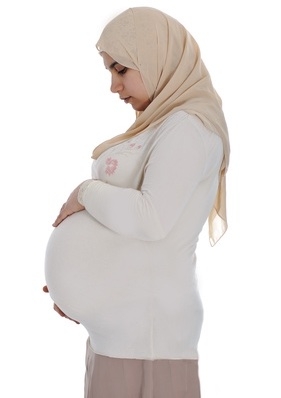 Many Asian / Muslim women face additional cultural pressures when it comes to pregnancy such as: Fasting Sometimes women may feel pressured to fast or may feel guilty for not fasting because fasting in the month of Ramadan is such an integral part of the Islamic faith. However, in Islam a pregnant woman or one that is breastfeeding does not have to fast. Despite this exemption many pregnant Muslim women choose to fast during Ramadan putting their own health and the health of their unborn baby at risk. Going without food and water particularly when Ramadan falls in the summer is hard anyway and for pregnant women, it is even harder. A foetus in its mother's womb, feeds and grows on the nourishment in her blood. A lack of nourishment can have an impact on the baby's health. For example, fasting has been linked to lower birth weights. It is important pregnant women should seek advice from health professionals if they decide to fast. Infertility In many cultures including in Muslim and Asian cultures, the worth of a women is often judged by her ability to produce children. If she can't or chooses not have children, she is often viewed as a failure. In fact, infertility is often immediately blamed on the women; their husbands are often not even tested to determine if they are infertile. Please remember your worth transcends your ability to procreate. In addition to coping with the enormous pressure to have children, couples facing infertility that wish to seek alternative solutions may then face further pressures on whether these are permissible in Islam. However, most religious scholars agree that many types of fertility treatment are allowed as long as the treatments do not go outside the bounds of the marriage relationship. Pressure to Have Sons In Asian / Muslim communities many women often feel there is a pressure on them to have boys. Some women are even abused and blamed for producing girls although it is the man who determines the gender of the child. Some women are even divorced for having too many girls. These cultural preferences for wanting sons may be resulting in some women feeling pressurised to abort female fetuses. It could be deemed illegal in Britain to have a termination on the grounds of the baby's gender. If you feel pressurised, please ask for help because no one should be forcing you to do anything that you don't want to do. Forced to give up Babies Girls who fall pregnant out of wedlock and choose to have their babies may be forced to hide their pregnancies by their parents who also refuse to let them have medical and maternity care. They may also be forced to give up their babies for adoption or hand them over to another family member. If you are in this situation, it is important you ask for help. |
||||||||||||||||||||||||||||||||||||||||||||||||||||||||||||||||||||||||||||||||||||||||||||||||||||||||||||||||||||||||||||||||||||||||||||||||||||||||||||||||||||||||
| Contact an organisation about this issue MWN Helpline is not responsible for the accuracy of the information provided and listing any organisation does not imply its endorsement.
| ||||||||||||||||||||||||||||||||||||||||||||||||||||||||||||||||||||||||||||||||||||||||||||||||||||||||||||||||||||||||||||||||||||||||||||||||||||||||||||||||||||||||
| You can also Find help using our system below | ||||||||||||||||||||||||||||||||||||||||||||||||||||||||||||||||||||||||||||||||||||||||||||||||||||||||||||||||||||||||||||||||||||||||||||||||||||||||||||||||||||||||
|
||||||||||||||||||||||||||||||||||||||||||||||||||||||||||||||||||||||||||||||||||||||||||||||||||||||||||||||||||||||||||||||||||||||||||||||||||||||||||||||||||||||||
|
||||||||||||||||||||||||||||||||||||||||||||||||||||||||||||||||||||||||||||||||||||||||||||||||||||||||||||||||||||||||||||||||||||||||||||||||||||||||||||||||||||||||



 (Current)
(Current) (Current)
(Current) (Previous)
(Previous) (Previous)
(Previous) (Previous)
(Previous) (Previous)
(Previous)